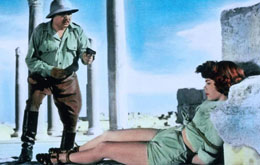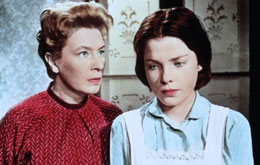Aka Romarey: operazione Mazaref
Director: Harald Reinl
West Germany / Italy
Certification number / date: 49021 del 30.04.67
First release date: 18.12.58 – 84′ (Germany)
Production companies: Arca Filmproduktion, Berlin (Germania Occ.), Arca Cinematografica (Rome)
Story & Screenplay: Gerda Corbett
Cinematography: Hans Schneeberger
Music: Willy Mattes
Editor: Johanna Meisel
Art direction: Ernst H. Albrecht
Cast: Carola von Kayser (Romarei), Joachim Hansen (Lorenz Ophofen), Leonard Steckel (Sir Boris Olinzoff), Dominique Wilms (Birgit), Werner Peters (Papas Leonidas), Reggie Nalder (Dewitz), Kurt Meisel (Baron de Tavel), Peter Mosbacher (Falkenreid), Ilse Steppat (Prang), Lei Ilima (Rhedda), Rein hard Kolldehoff (Blessing), Saro Urzì (Peppino), Lotte Stein (Frau Daub), Wolfgang Kienbaum (Kurtchen), Walter-Maria Wulf (King), Ilse Fürstenberg, Andre Saint-Germain, Ribardo Orlando

Harald Reinl’s Romarei, das madchen mit den grunen augen was an Italo-German co-production from 1958 which actually had very little input from Italy whatsoever. In fact, apart from Saro Urzì, an actor from Catania who frequently appeared in French or German co-productions, the only sign of any Italian involvement was the named production company, Arca Cinematografica, who were registered in Rome. Even this, though, would appear to be deceptive: Arca was also an established German production house, who were co-credited on both this and Liane, die weiße Sklavin (57), the only other apparent release from the Italian Arca, so it seems likely that the Roman branch was simply a front company registered solely as a way of accessing Italian funding.
Romarei (Carola von Kayser), a young girl with clairvoyant powers, is forced by her mother to use her special skills in the service of anyone who’s willing to pay a suitable amount of cash. She’s not happy about it, though, as she often foresees bad things happening to the people whose future she’s reading. Sometimes, though, this can come in useful; a vision of a collapsing elevator and a man with an eye patch allows her to forewarn her boyfriend, Lorenz (Joachim Hansen), about a terrible disaster that he would otherwise have died in.
Unfortunately, however, it also brings her to the attention of the super-rich magnate Sir Boris Olinzoff (Leonard Steckel), who may just happen to be the very same guy who was behind the ‘accident’ in the first place. He arranges to ‘buy’ Romarei from her mother, promising that he’ll provide her with a life of luxury in exchange for the occasional use of her precognitive talents to help him in pursuing his business interests.
At first, it doesn’t seem like too bad a deal. He seems like a perfect gentleman, Romarei is taken to live in his luxurious home in the Orient and, in exchange, she helps him locate some unknown oil fields in the desert. With time, though, it becomes clear that he’s far from the upstanding citizen he appears: the locals seem to have some kind of beef with him, he orders his maidservant to hypnotise her to sleep whenever she becomes a bit uppity and he has some very dodgy friends (who all seem intent on kidnapping her). The only person who can help her is Lorenzo, but he’s caught up in dealing with a glamorous blonde (Dominique Wilms) on his steamer ship.

This is very much an early example of the curious breed of adventure films that were being made in Germany during the turn of the decade, often with some kind of Italian participation. Antecedents of the Eurospy genre, they owe a lot to the plotting of popular novels by the likes of James Hadley Chase, and they act as a kind of lesser-known parallel genre to the Krimis, that were being made at around the same time. Because they’re not easy to classify, they tend to be rather forgotten, but the staple narrative ingredients are generally consistent: a young girl gets caught up with some kind of intrigue in an exotic location, and ends up having to be rescued by a dapper adventurer.
With Romarei, these elements are presented in a rather rudimentary form, and it feels rather more old fashioned than the likes of Hong Kong Hot Harbour (62), The Secret of the Chinese Carnation (64) and Voyage to Danger (62). The beginning section, especially, in which Romarei is forced to ply her telepathic trade by her adoptive mum, feels like the stuff of melodrama. In some ways the plot also feels like it’s aimed at children; it’s a kind of modern day update of Heidi, in which a young orphan (or near orphan) comes under the wing of a rich mentor, but has to overcome some subsequent problems before settling down into her new, improved lifestyle. There’s also a complete absence of irony and humour – traits which become more and more apparent as the sixties progressed – and a kind of disarming trust in the wealthy. Olinzoff, here, is revealed to actually be a good bloke with some unfortunate company, in later films his character would undoubtedly have become an urbane psychopath with a desire for world domination.
Spy film fans, though, will be able to take succour from several familiar elements from the genre: an ugly looking flower that opens to release a killer tarantula, exotic nightclub acts, protracted punch-ups, a gunfight in some touristy ruins. Harald Reinl directs with a little more pizzazz than many Italian filmmakers of the time, throwing in some decent – if basic – action scenes and making an attempt to keep the pace moving. It certainly feels like a lot more fun to watch than some of the swashbucklers of the time, such as Pia of Ptolomey, which had an inherent sluggishness that was becoming more untenable as the years progressed.
Regarding the performances, Carola von Keyser, who only made a couple more films, is OK if a little forgettable, which Joachim Hansen often played the upstanding hero in these kinds of films. Beyond that, there are a number of familiar supporting actors, including the excellent Werner Peters and Reggie Nalder, both of whom would later appear in Dario Argento’s The Bird with the Crystal Plumage.
Was released on VHS as ‘Todesfalle Tripolis’ in Germany.